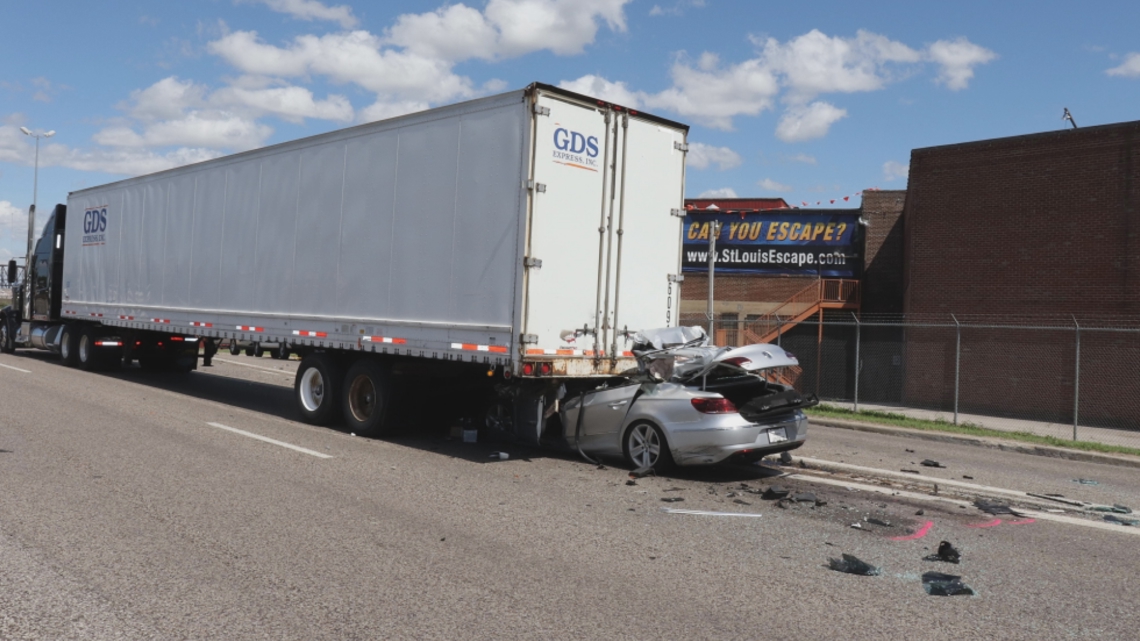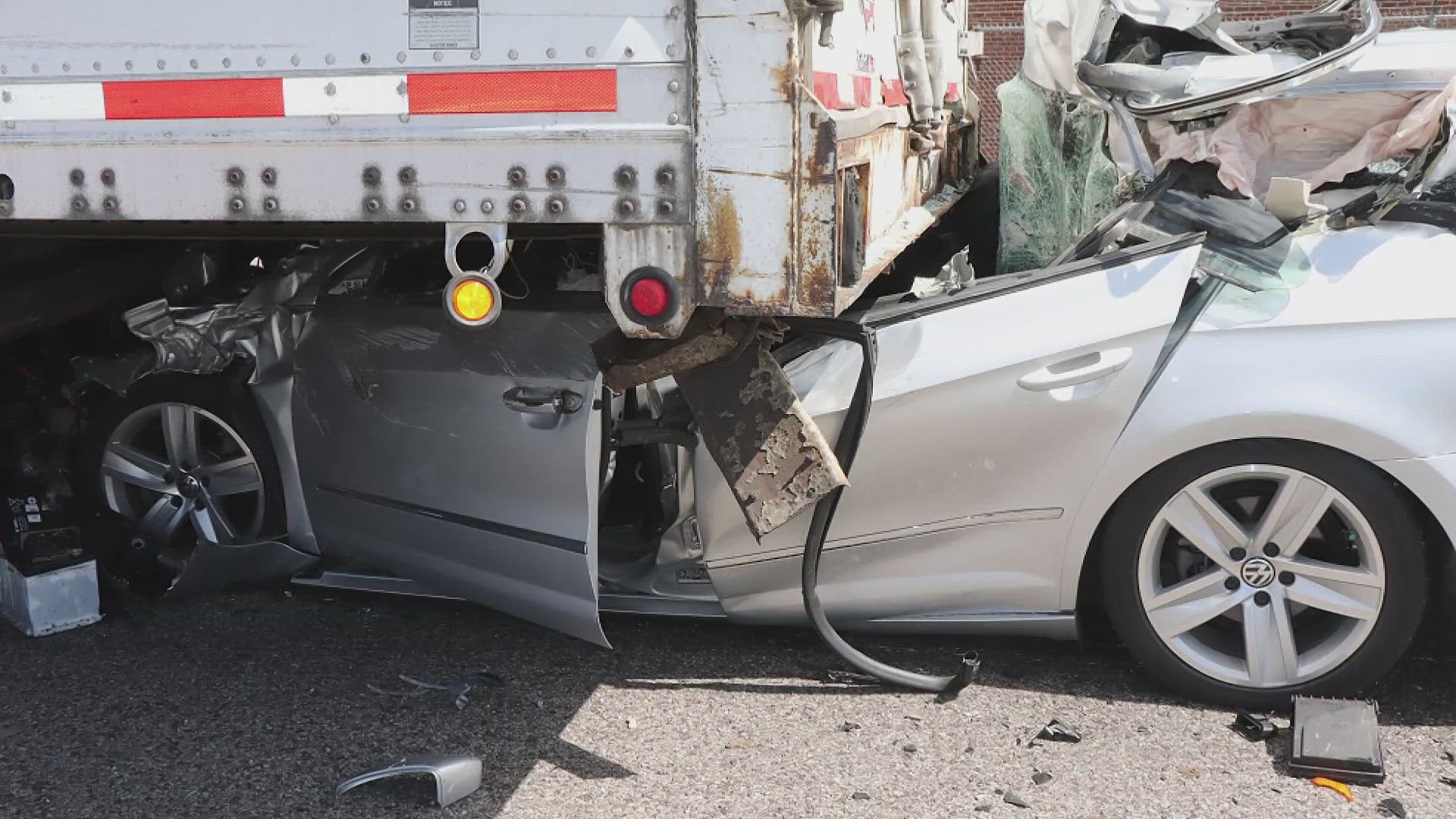ST. LOUIS — After a two-week trial, a St. Louis City jury awarded a $462 million verdict on Thursday to two St. Louis families.
A trailer manufacturer, Wabash National Corporation, was found responsible for the deaths of two fathers: 30-year-old Taron Tailor, who was driving, and his passenger, 23-year-old Nicholas Perkins.
The pair were instantly killed on May 19, 2019, when their car went underneath the rear of a trailer along Interstate 44 and 55 near the 7th Street exit.


At the time of their deaths, Perkins had a 2-year-old daughter and Tailor’s wife was pregnant.
Father and son Simon Law attorneys John Simon and Johnny Simon tried the case with co-counsel Brian Winebright of Cantor Injury Law and Lisa Tsacoumangos of Brown & Crouppen.
“We hope this case will begin to stop others from dying in these preventable underride accidents, as no amount of money will ever bring back the young men who needlessly lost their lives in this case,” said Tsacoumangos.


Attorneys said upon impact, the trailer's rear impact guard tore off and the car went underneath the trailer. This type of crash is called an underride, when a car slides underneath the body of a truck.
Johnny Simon said, "From what we know, this is one of the first rear underride crashes that has been tried to verdict in St. Louis City."
At trial, the attorneys argued the company ignored decades of research about the impacts of its rear impact guards, which are also called RIGs, to prevent this from happening.
"What they needed to make it safe, they could've done it decades ago," said John Simon. "The trailer in our case was consciously designed to prevent underrides on 30 miles per hour impacts. Every one of these trailers is on the highway. The minimum is forty miles per hour."
They believe money is one reason for the lack of change.
"We even had the figures to make a rig that would actually be safe and prevented this accident. According to these records, it costs $313 per trailer," John Simon added.
During closing arguments, Johnny Simon told jurors Wabash failed to build safer RIGs for 30 years and this would've cost Wabash about $15 million a year.
The jury awarded punitive damages at $450 million, which was the estimated amount the corporation saved by failing to include the safer RIGs for those 30 years.
While they believe cost may be a cause, the attorneys believe no amount of money is worth a life.
Johnny Simon told 5 On Your Side, "People are not numbers, they aren’t something to look at as a cost of doing business."
Compensatory damages included $6 million to the Perkins family and $6 million to the Tailor family.
Some of the evidence presented at trial dated to the 1967 underride crash that killed Hollywood actress Jayne Mansfield.
This St. Louis case shines a light on a bigger, national picture.
The Simons showed 2024 data that there are at least 14,350 known fatalities involving rear underride crashes. This number excludes deaths caused by side underride crashes.
Wabash National Corporation shared this statement:
"Wabash (NYSE: WNC) today announced it is evaluating all available legal options in response to the verdict by a St. Louis jury in Williams et al. v. Wabash. The case concerns a 2019 motor vehicle accident in which a passenger vehicle traveling at a high speed struck the back of a nearly stopped 2004 Wabash trailer.
“While this was a tragic accident, we respectfully disagree with the jury’s verdict and firmly believe it is not supported by the facts or the law,” said Wabash’s General Counsel and Chief Administrative Officer Kristin Glazner. “No rear impact guard or trailer safety technology has ever existed that would have made a difference here.”
The accident occurred nearly two decades after the trailer involved was manufactured by Wabash in compliance with all existing regulatory standards.
Additionally, despite precedent to the contrary, the jury was prevented from hearing critical evidence in the case, including that the driver’s blood alcohol level was over the legal limit at the time of the accident. The fact that neither the driver nor his passenger was wearing a seatbelt was also kept from the jury, even though plaintiffs argued both would have survived a 55-mile-per-hour collision had the vehicle not broken through the trailer's rear impact guard.
Wabash stands firmly behind the quality and safety of all its products, and this ruling will not prevent the company from continuing to provide its customers with products that contribute to safer roads."
Wabash will most likely appeal the decision.
The Simons explained the court made the rulings to excuse some information, including the driver’s blood alcohol level and seatbelt.
"We respect those rulings," John Simon added.

